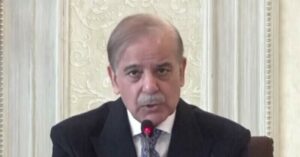OCTOBER, it seems, will see decisive moves in both the Middle East conflict and in Pakistani politics, and the next 25 days may well determine the shape of things to come for at least the coming two, possibly three, years.
Let’s start with the Middle East, where Israel has now decided to expand its ‘scorched earth’ policy from Gaza to Beirut and south Lebanon. It has already killed at least 1,500 people, mostly civilians, in Lebanon, in air raids and flattened apartment blocks, even as the militarily powerful Western nations offer direct or indirect support to the genocidal Israeli regime to ‘reshape’ the power structure in the region.
It is clear that any resistance to the onslaught is only going to come from the so-called Iran-led axis of resistance that includes Hezbollah, Syria and the Yemeni Houthis.
With Israel’s ground invasion of Lebanon awaited, what remains to be seen is whether Hezbollah lives up to its reputation as articulated by a middle-aged woman in Beirut whose words and images I saw on TV: “They are the masters of the air; we are the masters of the land. Let them come; we are waiting.”
It isn’t clear whether Israel’s decapitation of the Hezbollah leadership, after the demoralising pager attacks, has left intact the militant Shia Lebanese force’s command and coordination capacity/ structure in a position to confront and inflict heavy damage on the invading Israeli forces.
While the Middle East and parts of West Asia appear poised on a knife-edge, the Pakistani political landscape may well be shaped this month too.
In the same equation, after Iran launched a missile attack on Israel to ‘punish’ it for Ismail Haniyeh and Hassan Nasrallah‘s assassinations, the scale of the latter’s promised response is awaited. Iran has made clear that if attacked by Israel it will retaliate to devastating effect. That may take matters to the top of the escalation ladder.
Iran’s brave words are yet to be tested as are the claims of some of its spokesmen that Tehran’s missile capability ought not to be underestimated. Israel may have anti-missile capability but some of its potential (or clandestinely current) allies in the Middle East do not, particularly their oil infrastructure, which may be targeted.
For once, Israel and Iran’s neighbours and the US may be genuinely pushing for a de-escalation because the impact on the global economy of any damage to the Gulf oil infrastructure and even a temporary reduction of production and supply could plunge it into turmoil.
I suspect the world won’t have to wait too long for the Israeli response to Iran’s missile attack and the chain reaction that it may trigger. It could come on Oct 7 for its symbolic significance. While the Middle East and parts of West Asia appear poised on a knife-edge, the Pakistani political landscape for the next 24 to 36 months may well be shaped this month too.
The Supreme Court has now, on review, overturned by a 5-0 majority its earlier 3-2 verdict that floor-crossing members will not just run the risk of being de-seated but that their vote will not be counted either. Experts say the review decision is correct and reverses what was seen as ‘rewriting of the Constitution’ but also call the move controversial because of its timing, as the government may need opposition turncoats for a crucial vote.
Who in Pakistan isn’t aware of the government and its backers’ plan to push through a constitutional amendment in order to set up a Federal Constitutional Court to be entirely executive-appointed to start with? Regardless of the stated objective(s) of this proposed amendment, its primary purpose appears to be to stop Imran Khan’s march to freedom and possibly even back to power.
The government and the establishment believe that many judges of the superior courts are leaning towards the former prime minister and that their wings need to be clipped, even as these judges may just be inclined to dispense justice according to the law, as they see it.
Personally, if any amendment leads to a reduction in the role and reach of judges of the calibre and integrity of Justice Syed Mansoor Ali Shah (next in line to be the CJP starting Oct 26) and Justice Babar Sattar of the Islamabad High Court, to name just two, we will be so much the poorer.
Imran Khan is aware of the ramifications of the passages of such as an amendment and, therefore, called on his supporters to protest. Till the writing of this column some of the protesters led by the KP Chief Minister Ali Amin Gandapur reached the inner recesses of the capital, many literally just metres away from the designated rendezvous, the D-Chowk, despite all the blockades and heavy police presence.
But, at the time of writing, the KP chief minister himself was said to be besieged in KP House in the heavily protected official enclave by a contingent of the paramilitary Rangers. In and around D-Chowk itself, the police strategy seems to be to try and disperse anyone who tries to gather there. Again as these lines are being written this strategy seems to be working as a crowd in any significant numbers hasn’t gathered in the area, though people are still trickling in. And more could be on their way.
To change the government and the establishment’s stance on the protest, much larger numbers would have to be assembled. Else, the PTI’s gamble to get its supporters on the streets to match the number of those who voted for the party in the February elections would not have delivered.
Equally, there is always the remote possibility that the government may not be able to muster the two-thirds majority required in each House to pass the amendment. As things stand, one suspects that more draconian steps may follow if that were to happen. October promises to be a volatile one for Pakistan and for the region in close proximity.
The writer is a former editor of Dawn.
Published in Dawn, October 6th, 2024







